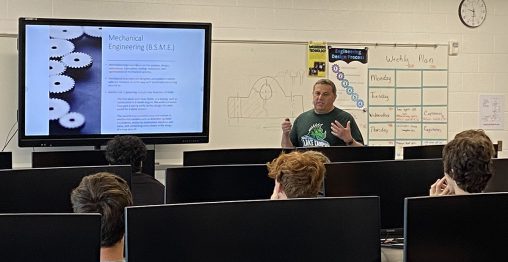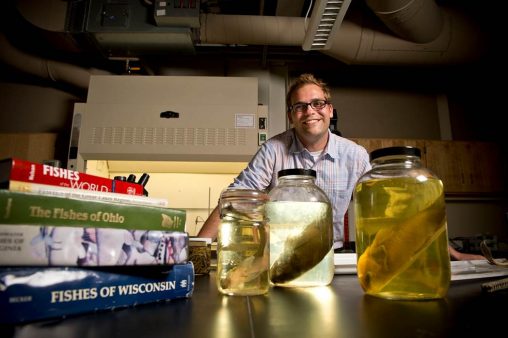
Chuck Ciampaglio, director of the Lake Campus Science, Math and Engineering Unit and professor of earth and environmental sciences, gave a presentation to high school students at Tri Star Career Compact as part of the Faculty Ambassadors Program.
Wright State University’s Lake Campus has launched a Faculty Ambassadors Program that will give high school students a look at college faculty in their own backyard who are changing the world.
“There are really impressive, widely recognized faculty here at Lake Campus who are experts in fascinating fields,” said Dan Krane, Ph.D., interim dean of the Lake Campus. “We are thrilled to have this opportunity to introduce students to these amazing individuals and to give them a sense about what they might be able to accomplish themselves by continuing their educations.”
The Lake Campus Faculty Ambassadors Program kicked off Sept. 15 at Tri Star Career Compact in Celina with a presentation by Chuck Ciampaglio, Ph.D., director of the Lake Campus Science, Math and Engineering Unit and professor of earth and environmental sciences.
The program enables faculty to bring their expertise and real-world experience to the students as guest lecturers.
For example, Ciampaglio holds a doctorate in paleontology and is one of the world’s leading authorities on sharks. He has become a darling of the National Geographic, Discovery and Smithsonian television channels when they do shows examining the history, characteristics and behavior of sharks.
Steve Jacquemin, Ph.D., professor of biological sciences, is a nationally known wetlands and water quality expert, widely recognized for his work in gauging the health of lakes, rivers and streams. His EPA-funded research is helping farmers act as better stewards of their land. Ohio Gov. Mike DeWine invited him to discuss how wetlands can help reduce nutrient runoff and harmful algal blooms.
And Krane himself, a professor of biological sciences, is one of the world’s foremost DNA experts and has testified as an expert witness in more than 120 criminal trials in which DNA evidence was presented. He is the president of Forensic Bioinformatics, which has reviewed testing from hundreds of often very high-profile cases around the world every year since 2002. And he has appeared as an expert on television newsmagazine shows such as “20-20” and “48 Hours.”
More than a dozen Lake Campus faculty members are volunteering to participate in the Faculty Ambassadors Program, offering expertise in everything from engineering and nursing to economics and criminal justice.
High school teachers in Mercer and Auglaize counties can use a convenient website to request a faculty member to present to their classes.

Steve Jacquemin, professor of biological sciences at the Lake Campus, is a nationally known wetlands and water quality expert.
The Faculty Ambassadors Program gives high school students the opportunity to get a fresh perspective on course material, learn about research methods and Lake Campus projects, and explore career options as well as scholarship and internship opportunities.
“Students need to understand there are opportunities to make important contributions to society by diving deep into the things that excite them in their studies in addition to learning skills that will help them to make a living,” said Krane.
Aubrey Jaqueth, Ph.D., assistant professor of agriculture, spoke to a Future Farmers of America class. She said the ambassadors program is exciting for faculty because it enables them to reach out to the community and future students.
“Creating a relationship with our students even before they step on campus is something I hope will build the Lake Campus community as well as interest in our academic programs,” she said. “We offer a quality education at a great value and have many talented faculty members at the Lake. This is a unique way to showcase that.”
Ciampaglio made the first presentation to a Tri Star Career Compact engineering technology class consisting of 18 juniors and two seniors. He provided an overview of STEM programs at the Lake Campus and discussed the Mechanical Engineering Program, the careers those engineering graduates currently have and the nearly 20 companies that employ them. He also presented on the Industrial and Systems Engineering Program.
In addition, Ciampaglio told students about the Lake Campus Library and Technology Center, Student Success Center, study areas, bookstore and dining hall. He also detailed resources that are available to students such as tutoring and academic advising as well scholarships.
“The expertise of Lake Campus faculty should not be a best-kept secret,” said Ciampaglio. “This program is a way for us to shout from the rooftops who we are and the opportunities available to the community.”

 Wright State psychology team studies ways to identify fatigue in pilots, drivers
Wright State psychology team studies ways to identify fatigue in pilots, drivers  Wright State videographer Kris Sproles wins Regional Emmy and Ohio journalism award
Wright State videographer Kris Sproles wins Regional Emmy and Ohio journalism award  Wright State Boonshoft School of Medicine ranked among the nation’s best for 2024 by U.S. News
Wright State Boonshoft School of Medicine ranked among the nation’s best for 2024 by U.S. News  Exposing biotechnology
Exposing biotechnology  Wright State faculty member Dan Noel uses unique background to inspire new leaders
Wright State faculty member Dan Noel uses unique background to inspire new leaders 